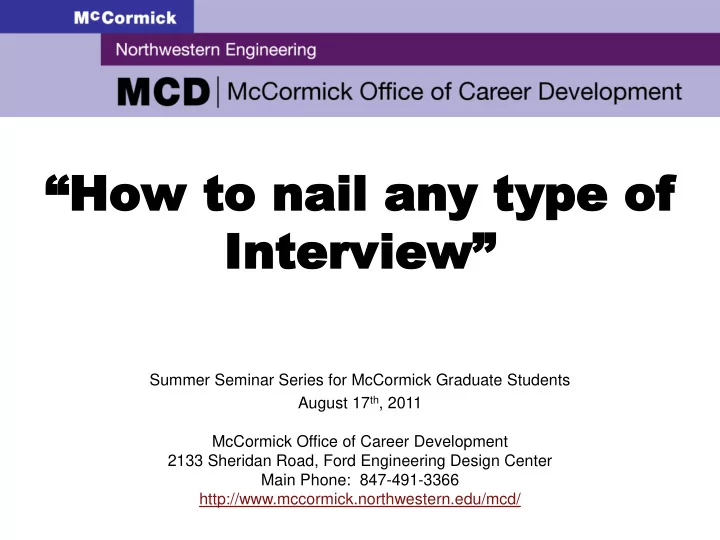

“How to nail any type of Interview” Summer Seminar Series for McCormick Graduate Students August 17 th , 2011 McCormick Office of Career Development 2133 Sheridan Road, Ford Engineering Design Center Main Phone: 847-491-3366 http://www.mccormick.northwestern.edu/mcd/
Objectives • To better understand the interview process: the before, during, and after • To be aware of the appropriate interviewing behaviors • To learn about different interview strategies • To practice interviewing skills
Before the Interview • Research the industry/company • Identify reasons for wanting to work or having interest in that industry/company • Recall situations that show favorable behaviors/actions • Analyze the skills the employer is seeking • Practice answering common interview questions • Prepare questions to ask the employer • Obtain the appropriate attire for the interview
Skills/Qualities Sought • • Ability to learn Organization Skills • • Technical Skills Motivation • • Communication skills Problem Solving • • Critical thinking Maturity • • Personal management Professional Judgment • Teamwork • Leadership • Adaptability NOTE: Know the specific technical skills for your areas of interest!
Company/Industry Research • Learn more about the industry • Wetfeet.com • Vault.com • Factiva.com • Informational Interviews & Networking • Learn about the company • Crain’s Business • Glassdoor.com • Company Website
Types of Interviews Traditional • Interviewer ask open ended questions that often come from your resume. Behavioral • Based upon skills and competencies. Technical • Used to assess candidates for technical or specialist positions (Jobs in IT, Engineering / Science) Case • Commonly asked in consulting interviews. Interviewer will ask you a case and ask you to solve the problem.
Goals of the Interview Goals of the Candidate (you): • To obtain information about the job/organization. • To communicate important information about yourself. • To make a positive impression upon the employer. Goals of the Interviewer: • To promote the organization and attract the best candidate. • To assess if qualifications match the job requirements. • To determine candidate fit with the organization and staff.
Traditional Interviews • Less common now due to popularity of behavioral and case interviews • Tend to focus on hypothetical situations, management style
Tell me about yourself… A common traditional question. Importance: Share information • First Impression still malleable the employer may • Tone of interview not already know • Provide depth to resume and present it in a way that connects • Insight into who you are to the position you are seeking.
Behavioral Interviewing “ The best predictor of future performance is past performance in similar situations.” Use the STAR technique • S ituation, or • T ask, leading to the • A ctions taken or not taken by the applicant, and the • R esults or changes caused by these actions.
Behavioral Based Questions • Tell me about a time that you worked on a team based project? • Tell me about a time in which you received constructive feedback and how did you handle it. • Tell me about a project that you initiated.
Technical Interviewing • Questions asked about specific technical activities related to one’s work • May require candidates to solve actual technical problems they face in the workplace
Technical Question Source: Jeeve Technologies LLC
Case Interviewing It is a simulation, or role-play, where the interviewer is the client who has all the information Analytics Poise • • Provide structure to Appear excited by the kinds of issues consultants face. unstructured problems. • Are not intimidated by process • Break problems into components. or problems. • Apply transparent, logical thinking • Assimilate information quickly to each component. and effectively. • Synthesize discussion into solution. • Ask insightful questions. Source: Goizueta Business School / BCG
Source: McKinsey
Potential Case Question Q. How many razor-blades are sold in the United States every year? • Where to start? • Population of USA = 300 million • Break population down • Males = 50% of 300 million = 150 million • Assume only males 18+ use blades = 75% of 150 million = 110 million • Determine Usage • Assuming that, 70% use shaving blades (others go to barber, don’t shave etc), users = 80 million • Assuming users shave once in 2 days on average = 40 million shaves/ day • Assuming one blade is good for 2 shaves on average = 20 million blades/ day • Blades sold per year = 365 x 20 million = 7.3 billion
Asking Good Questions • Prepare questions before the interview • They should be thoughtful and relevant • Address the position, skills, qualifications, etc… • Avoid salary benefits and/or personal topics
Additional Tips • Practice (mock interviewing) • Pre-Interview & Greeting • About Your Body Language • Write a thank-you note / email
5 Common Pitfalls in Interviews • Not able to articulate why you are a good candidate for the position. • Candidate doesn’t know why he/she wants the job. • Candidate doesn’t know anything about the company. • Candidate doesn’t have any questions to ask. • The interviewee is not personable, enthusiastic, or conversational. Source: Vault.com
Recommend
More recommend